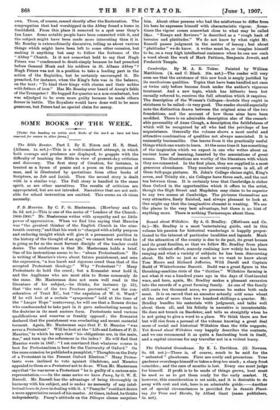F. .D. Maurice. By C. F. G. Masterman. (Mowbray and
Co. 8s. 6d. net.)—This is one of the series of "Leaders of the Church, 1800-1900." Mr. Masterman writes with sympathy and no little power of appreciation. When we find him saying that Maurice was "the greatest thinker of the English Church in the nine- teenth century," and that his work is "charged with a lofty purpose and enduring insight which will give it a permanent position in the history of the thought of an age," we cannot but own that be is going as far as the most fervent disciple of the teacher could desire. The misfortune is that Mr. Masterman holds a brief. One of his instructions seems to be : "abuse Protestantism." He is writing of Maurice's views about future punishment, and uses the expression, "a less harsh and rigorous creed than that of the accepted Protestant theology." Why " Protestant " ? Many Protestants do hold the creed ; but a Romanist must hold it, and the Anglicans who are most akin to Rome commonly do the same. Mr. Masterman does not seem well read in the literature of his subject,—he thinks, for instance (p. 52), that "the veto of the two Proctors prevented." not the con- sideration of Tract %C., but "the expulsion of W. G. Ward." If he will look at a certain "symposium" held at the time of the "Larger Hope" controversy, he will see that a Roman divine who condescended to take part in it gave unhesitating assent to the doctrine in its most austere form. Protestants used various qualifications and reserves or frankly opposed ; the Romanist declared that the punishment was everlasting and meant material torment. Again, Mr. Masterman says that F. D. Maurice "was never a Protestant." Will he look at the "Life and Letters of F. D. Maurice," to which he says that "his obligations are, in the main, due," and turn up the references in the index ? He will find that Maurice wrote in 1847: "I am convinced that whatever course is best for Protestantism is best for the University of Oxford." On the same occasion he published a pamphlet," Thoughts on the Duty of a Protestant in the Present Oxford Election." Many Protes- tants were inclined to vote against Gladstone, and Maurice appealed to them as a Protestant not to do so. When Mr. Masterman says that "he was never a Protestant "he is guilty of a serious mis- representation.—In the same series we have Pusey, by G. W. E. Russell, Mr. Russell has the advantage of being thoroughly in harmony with his subject, and is under no necessity of any intel- lectual tours de force in dealing with it. A" Puseyite" could not desire a more appreciative record of his master. At times, indeed, he thinks independently. Pussy's attitude on the Pi/toque clause surprises him. About other persona who had the misfortune to differ from his hero he expresses himself with characterietki vigour. ,Some- times the vigour comes somewhat close to what may be called liSins. "Essays and Reviews" is described as a "rough hash of heresies and platitudes." We do not know by what right Mr. Russell passes judgment in the matter of heresy ; but about ." platitudes" we do know. A. writer must be, or imagine himself to be, on a very high intellectual eminence when he can use such a word about the work of Mark Pattieon, Benjamin Jewett, and Frederick Temple.






































 Previous page
Previous page